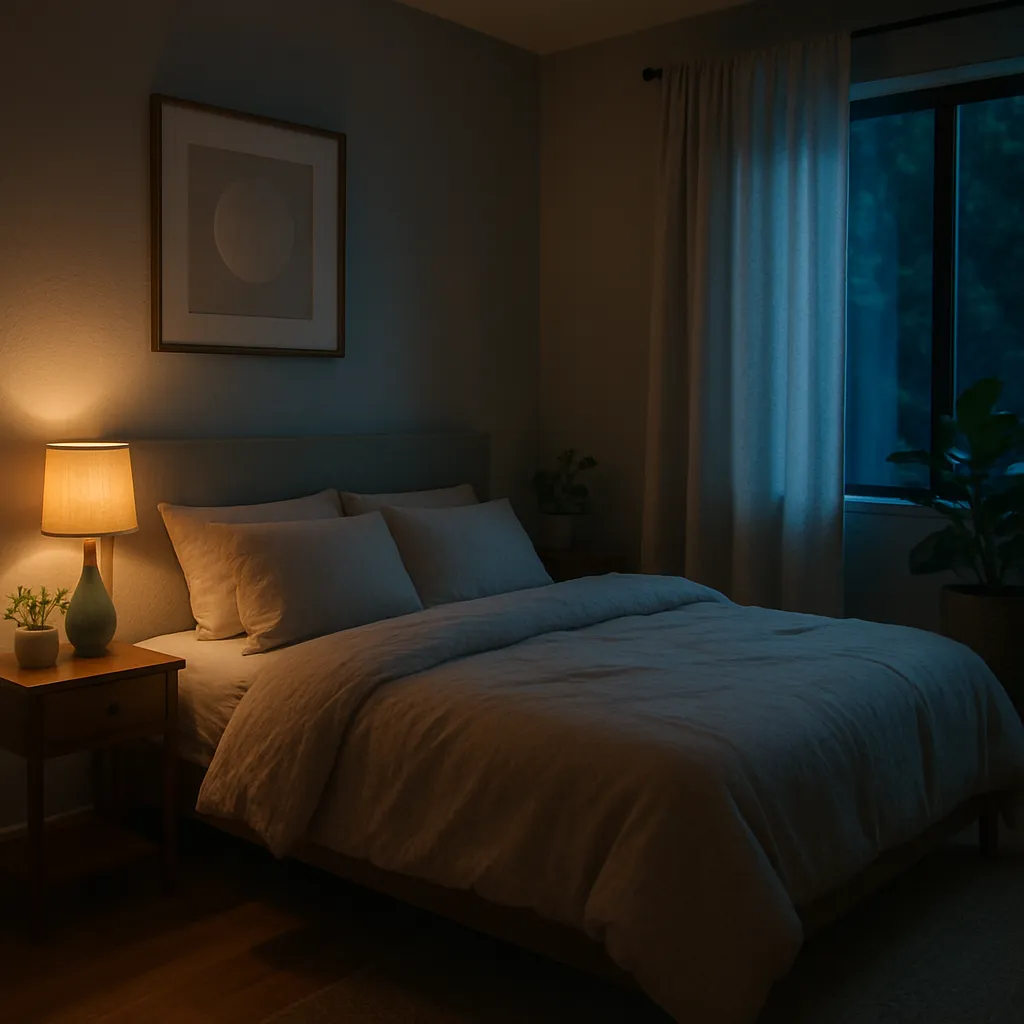Stop Snoring Tonight: Proven Methods to End Disruptive Sleep
Published Date: May 28, 2025
Snoring affects nearly half of all adults occasionally, and about 25% are habitual snorers. While it might seem like a harmless nighttime nuisance, chronic snoring can significantly impact both your sleep quality and your relationships. More importantly, persistent loud snoring can be a warning sign of obstructive sleep apnea, a serious condition that requires medical attention. Whether you're dealing with occasional snoring or chronic nighttime disruptions, understanding the causes and implementing proven solutions can help you achieve quiet sleep and improve your overall sleep health.
Understanding Why We Snore
Snoring occurs when air flows past relaxed tissues in your throat, causing them to vibrate and create the familiar snoring sound. During sleep, the muscles in your throat naturally relax, but in some people, this relaxation causes the airway to narrow significantly. Several factors can contribute to this narrowing:
Anatomy and Physical Factors: The shape and size of your mouth, throat, and nasal passages can predispose you to snoring. A thick soft palate, enlarged tonsils, or a deviated septum can all contribute to airway obstruction. Additionally, being overweight can add extra tissue around the neck, putting pressure on the airway.
Sleep Position: Sleeping on your back allows gravity to pull the tongue and soft tissues backward, partially blocking the airway. This is why many people snore more when sleeping in this position.
Age and Gender: As we age, our throat muscles become less toned, increasing the likelihood of snoring. Men are also more likely to snore than women, partly due to anatomical differences in airway structure.
Lifestyle Factors: Alcohol consumption, smoking, and certain medications can relax throat muscles excessively, leading to increased snoring. Nasal congestion from allergies or colds can also force mouth breathing, which often results in snoring.
 Snoring Causes
Snoring Causes
Figure 1: A couple sleeping peacefully, representing the goal of quiet, undisturbed sleep.
Simple Lifestyle Changes That Work
Many cases of mild to moderate snoring can be significantly improved through simple lifestyle modifications. These snoring remedies are often the first line of defense and can be highly effective:
Weight Management: Even a small amount of weight loss can reduce fatty tissue in the back of the throat and decrease snoring. Focus on a balanced diet and regular exercise to achieve and maintain a healthy weight. This approach not only helps with snoring relief but also improves overall health.
Sleep Position Optimization: Training yourself to sleep on your side can dramatically reduce snoring. Try sewing a tennis ball into the back of your pajama top to prevent rolling onto your back, or use a body pillow to maintain side sleeping. Some people find that elevating the head of their bed by 4-6 inches helps keep airways open.
Establish Good Sleep Hygiene: Maintaining consistent sleep habits can improve overall sleep quality and reduce snoring. Go to bed and wake up at the same time each day, create a relaxing bedtime routine, and ensure your bedroom is conducive to restful sleep with appropriate temperature, darkness, and quiet.
Stay Hydrated: Dehydration can make the secretions in your nose and soft palate stickier, leading to increased snoring. Drink plenty of water throughout the day, but avoid large amounts before bedtime to prevent nighttime awakenings.
Addressing Nasal and Throat Issues
Many snoring problems stem from nasal congestion or throat irritation. Addressing these issues can provide significant snoring relief:
Nasal Strips and Dilators: External nasal strips can help open nasal passages, while internal nasal dilators can be even more effective for some people. These simple devices can improve airflow through the nose, reducing the need for mouth breathing.
Saline Rinses: Regular nasal irrigation with saline solution can help clear congestion and reduce inflammation in nasal passages. This is particularly helpful for people with allergies or chronic sinus issues.
Humidification: Dry air can irritate the membranes in your nose and throat. Using a humidifier in your bedroom can help keep these tissues moist and reduce snoring. Aim for humidity levels between 30-50%.
Address Allergies: If allergies contribute to nasal congestion, work with your healthcare provider to develop an effective treatment plan. This might include antihistamines, nasal corticosteroids, or allergy shots.
 Snoring Solutions
Snoring Solutions
Figure 2: A peaceful bedroom environment that promotes healthy sleep and reduces snoring.
When Snoring Signals Something More Serious
While occasional snoring is usually harmless, certain warning signs indicate that your snoring might be related to sleep apnea, a serious condition that requires medical attention:
Loud, Persistent Snoring: If your snoring is loud enough to wake others or yourself, it could indicate airway obstruction severe enough to cause breathing interruptions.
Witnessed Breathing Pauses: If your partner notices that you stop breathing during sleep, followed by gasping or choking sounds, this is a strong indicator of obstructive sleep apnea.
Excessive Daytime Sleepiness: If you're getting adequate sleep time but still feel tired during the day, your snoring might be fragmenting your sleep and preventing restorative sleep.
Morning Symptoms: Waking up with headaches, dry mouth, or a sore throat can indicate that your snoring is severe enough to affect your sleep quality.
If you experience these symptoms, it's important to consult with a sleep specialist who can evaluate whether you need a sleep study to diagnose potential sleep disorders.
Advanced Solutions and Medical Interventions
For persistent snoring that doesn't respond to lifestyle changes, several medical interventions can provide relief:
Oral Appliances: Custom-fitted dental devices can help keep your airway open by repositioning your jaw or tongue during sleep. These are particularly effective for people with mild to moderate obstructive sleep apnea or primary snoring.
CPAP Therapy: For those diagnosed with sleep apnea, CPAP therapy is often the most effective treatment. This sleep technology provides continuous air pressure to keep airways open throughout the night.
Surgical Options: In some cases, surgical procedures can address anatomical issues that contribute to snoring. These might include removing excess tissue, correcting a deviated septum, or repositioning jaw structures.
Radiofrequency Treatments: Minimally invasive procedures that use radiofrequency energy to tighten tissues in the soft palate can reduce snoring in some patients.
 Medical Solutions
Medical Solutions
Figure 3: A person exercising outdoors, showing the energy and vitality that comes from quality sleep.
Creating a Snore-Free Sleep Environment
Your sleep environment plays a crucial role in promoting quiet sleep. Consider these environmental factors:
Bedroom Setup: Ensure your bedroom is optimized for sleep with blackout curtains, comfortable temperature (around 65-68°F), and minimal noise. A white noise machine can help mask any remaining sounds.
Pillow and Mattress Selection: The right pillow can help maintain proper head and neck alignment, keeping airways open. Some people benefit from anti-snoring pillows designed to encourage side sleeping.
Air Quality: Keep your bedroom air clean and free from allergens. Regular cleaning, using air purifiers, and washing bedding in hot water can help reduce irritants that contribute to nasal congestion.
The Path to Better Sleep for Everyone
Addressing snoring isn't just about stopping an annoying sound – it's about improving sleep health for both you and your partner. Quiet sleep leads to better relationship harmony, improved daily energy, and enhanced overall well-being. Whether through simple lifestyle changes or medical intervention, effective snoring solutions are available.
Remember that persistent, loud snoring accompanied by other symptoms should always be evaluated by a healthcare professional. Early intervention can prevent the development of more serious sleep disorders and help you achieve the healthy sleep that's essential for optimal health and quality of life.
Don't let snoring continue to disrupt your nights and days. Take action today to explore the snoring remedies that work best for your situation and start your journey toward peaceful sleep and better health.
Related Articles
- Tracking Your Sleep with Technology: A Step-by-Step Guide
- Understanding Your Sleep Patterns with Self-Test Questionnaires
- Why You Look Older: How Snoring Secretly Changes Your Face (And What To Do About It)

